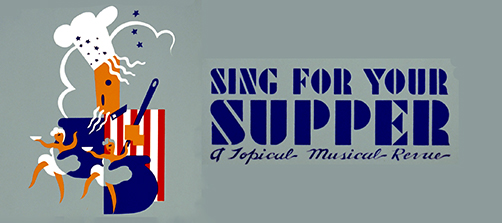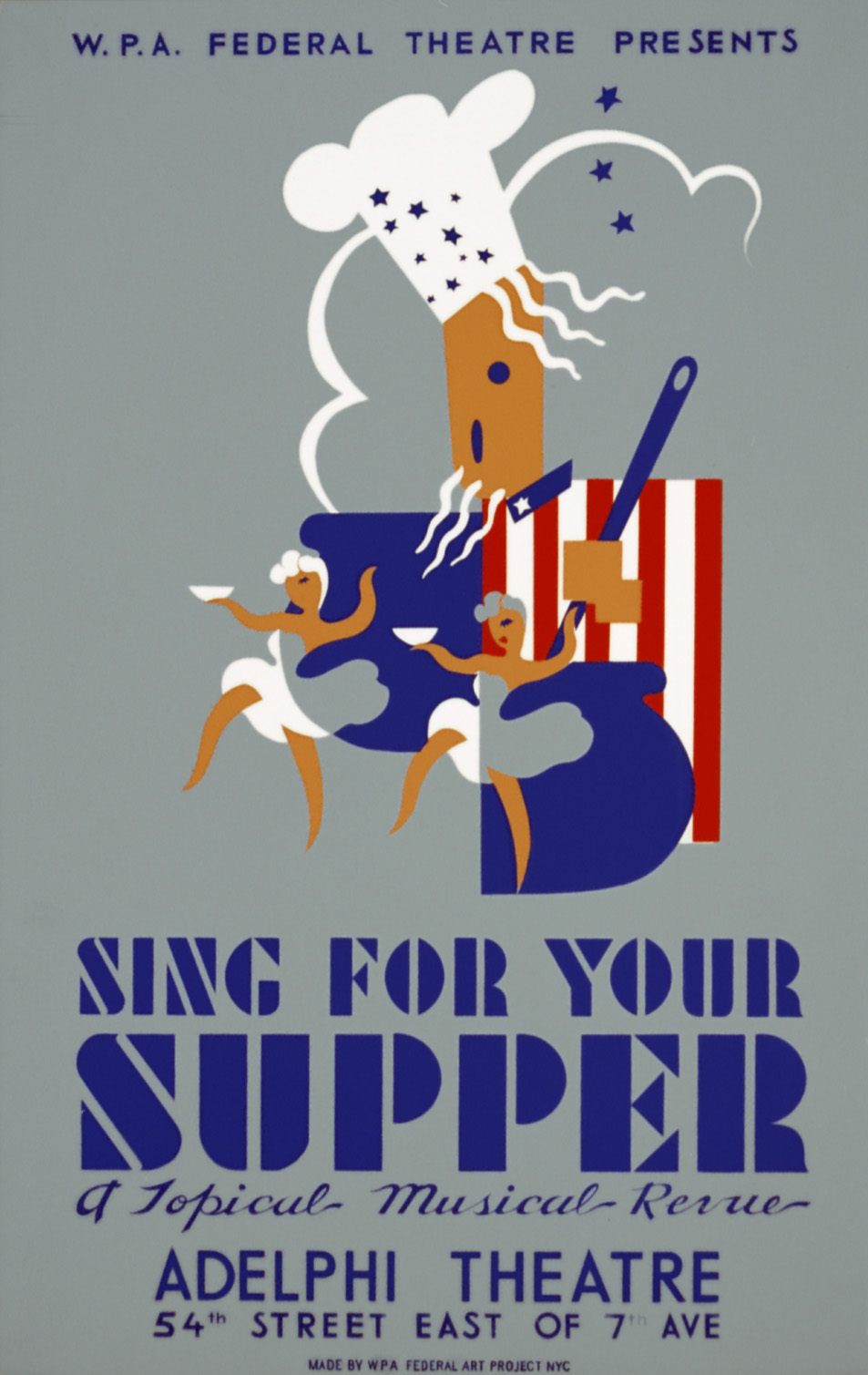
Sing for Your Supper included a sequence about finances with the overall title “A Tisket A Tax It” which included the songs “Bonnie Banks,” “How Can We Swing It,” and “Oh, Boy, Can We Deduct”; another (“Papa’s Got a Job”) looked at an about-to-be-dispossessed family that gets a last-minute reprieve when the breadwinner lands a job; and “Leaning on a Shovel” praised the WPA and the jobs it created. A look at politics included the dance sequence “The Last Waltz,” which began with the traditional waltz “Blue Danube” and soon morphed into a goose-stepping march, and “Ping Pong on the Pacific,” which looked at the military (including a character named Admiral Stuffit). And John Latouche and Lee Wainer provided “Perspiration,” a spoof of Blitzstein’s The Cradle Will Rock (among the characters were Mr. Bankbook and Mr. Zipper).
The most memorable sequence from the revue was “Ballad for Americans,” in the program titled “Ballade of Uncle Sam” and sometimes known as “Ballad of Uncle Sam,” lyric by John Latouche and music by Earl Robinson. Later heard in the 1942 MGM film Born to Sing, where it served as the movie’s finale and was staged by Busby Berkeley, the song celebrated the American way and in many respects was a precursor to Robinson’s “The House I Live In” (lyric by Lewis Allen) from the 1942 Broadway revue Let Freedom Sing. This last was later popularized by Frank Sinatra, who performed it in the ten-minute film The House I Live In, which was released by RKO in 1945. In the same genre as “Ballad for Americans” and “The House I Live In” is “The Tenement Symphony” from the Marx Brothers’ 1941 MGM film The Big Store. It was sung by Tony Martin (with lyric and music by Sid Kuller, Ray Golden, and Hal Borne), and according to Clive Hirschhorn in The Hollywood Musical, the sequence was “one of MGM’s all-time worsts.” Another song of this type is “Home,” which was sung by Paul Binotto in the 1980 musical Swing, which closed during its pre-Broadway tryout (lyric by Alfred Uhry, music by Robert Waldman).
For all purposes, the short-lived left-wing revue Sing for Your Supper shut down the Federal Theatre Project. It was an egregious example of the federal government’s support of an out-of-control production that wouldn’t have been tolerated by a private producer. The show was in rehearsal for eighteen months, and many felt that even then it wasn’t in shape for Broadway. Critics of the FTP had been unhappy that the organization supported left-wing plays, musicals, and revues financed by the taxpayer, and of course Marc Blitzstein’s The Cradle Will Rock was the most notable example of a work that took the dollars of capitalists, or taxpayers, to criticize capitalism, the government, and the members of the middle class whose taxes helped fund the musical.
Sing for Your Supper was a lightning rod because of its cost overruns, and it became the poster child for anti-FTP proponents who used it as an example of a production that was allowed to run wild with no one at the controls. Henry N. Dorris in the New York Times reported that the House Appropriations Subcommittee heard testimony that for Sing for Your Supper “so much lighting equipment had been bought and put on the stage that ‘it sunburned the actors’ ankles.’” A later unsigned article in the Times noted that the revue had been “beset by a comedy of errors” and had “been kicked about from pillar to post for more than a year before it finally got on the boards.”
As for accusations that the FTP emphasized left-wing entertainment, a special boxed disclosure was soon added to the title pages of FTP programs and provided a disclaimer: “The Federal Theatre Project is part of the WPA program. However, the viewpoint expressed in its productions is not necessarily that of the WPA or any other agency of the government.”
Aucun dossier informatif complémentaire concernant Sing for Your Supper
Aucun dossier informatif complémentaire concernant Sing for Your Supper

Version 1
Sing for Your Supper (1939-04-Adelphi Theatre-Broadway)
Type de série: OriginalThéâtre: George Abbott Theatre (Broadway - Etats-Unis) Durée : 2 mois 1 semaine Nombre : 44 représentationsPremière Preview : 24 April 1939
Première: 24 April 1939
Dernière: 30 June 1939Mise en scène : Robert H. Gordon • Harold Hecht • H. Gordon Graham • Chorégraphie : Producteur : Star(s) : Avec: Theresa Alvarez, Bidda Blakeley, Virginia Bolen, William Britten, John Campbell, Carl Chapin, Gordon Clarke, Edwin Cooper, Peggy Coudray, Carol Coult, Muni Diamond, Arthur Donaldson, Richard Finlayson, Rufus Finlayson, Edward Fuller, Edith Groome, Paul Jacchia, Edward LeDuc, Paula Laurence, William Myron, Theodora Peck, Coby Ruskin, Allan Tinney, William Tinney, Bowen (later, Sonny) Tufts, Lee Wainer, Hansford Wilson, Edwin Whittner; Choral Ensemble: Spencer Barnes, Willis Bradley, Bonnie Clark, William Clayton, Eva Connell, Leon Diggs, Ethel Drayton, James Eakins, Estelle Ehrlich, Genora English, Walter Franklyn, Trudy Goodrich, Edward Gutter, Joseph Hall, Lena Halsey, Harry Hart, Roslyn Harvey, Edward Hemmer, Roy Holland, Vivian Holt, Minnie Hylton, Augustina Josephs (aka Joseph), Louise Kelly, Adela Leo, Walter LeRoy, Alex Lovejoy, Muriel McCrory, Ruby Meyers, Ernest Pavano, Alice Ramsey, Clarence Redd, Emma Sealy, Maurice Siegel, Violet Smith, Ruth Thompson, Virgil VanCleve, Muriel Watts, George Whittington; Modern Dance Ensemble: Joseph Bell, Naomi Bodine, Mann Brown, Marjorie Church, John Connolly, William Elliott, Lily Verne, William Garrett, Julia Lane, Israel Lansky, Ray Lieb, Eve Lord, Virginia Mansfield, Vivian Funston, Martin Michel, Lou Rosen, Attilio Salzano, Georgette Schneer, Maurice Silvers, Sidney Stark, Ruth White; Negro Tap Ensemble: J. Mae Batie, John Berry, Doris Bramble, William Brown, Lenore Cobb, George DeFour, St. Clair Dotson, Hilaria Friend, Dorothy Gee, Iris Griffith, Theresa Jentry, Ruth LaMarr, Ruth Lindsay, Blue McAllister, James Mordecai, Samuel Owens, Andre Pampleon, Rose Poindexter, Libby Robinson, Elsie Sealy, Lee Speaks, Dorothy Turner, Allen Williams, Costello Woolridge
Pas encore de video disponible pour ce spectacle